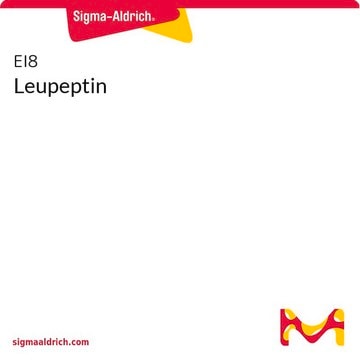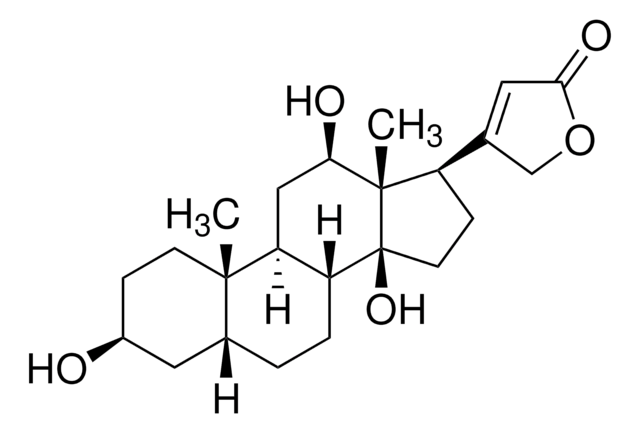E3132
E-64
protease inhibitor
동의어(들):
trans-Epoxysuccinyl-L-leucylamido(4-guanidino)butane, L-trans-3-Carboxyoxiran-2-carbonyl-L-leucylagmatine, N-(trans-Epoxysuccinyl)-L-leucine 4-guanidinobutylamide
About This Item
추천 제품
생물학적 소스
synthetic (organic)
분석
≥98% (HPLC)
형태
powder
solubility
water: 20 mg/mL, clear, colorless to faintly yellow
저장 온도
2-8°C
SMILES string
CC(C)C[C@H](NC(=O)[C@@H]1O[C@H]1C(O)=O)C(=O)NCCCCNC(N)=N
InChI
1S/C15H27N5O5/c1-8(2)7-9(20-13(22)10-11(25-10)14(23)24)12(21)18-5-3-4-6-19-15(16)17/h8-11H,3-7H2,1-2H3,(H,18,21)(H,20,22)(H,23,24)(H4,16,17,19)/t9-,10+,11+/m0/s1
InChI key
LTLYEAJONXGNFG-HBNTYKKESA-N
유사한 제품을 찾으십니까? 방문 제품 비교 안내
일반 설명
- cathepsin K
- cathepsin L
- cathepsin S
- calpain
- cathepsin B
- cathepsin H
- papain
애플리케이션
생화학적/생리학적 작용
제조 메모
Storage Class Code
11 - Combustible Solids
WGK
WGK 3
Flash Point (°F)
Not applicable
Flash Point (°C)
Not applicable
개인 보호 장비
Eyeshields, Gloves, type N95 (US)
시험 성적서(COA)
제품의 로트/배치 번호를 입력하여 시험 성적서(COA)을 검색하십시오. 로트 및 배치 번호는 제품 라벨에 있는 ‘로트’ 또는 ‘배치’라는 용어 뒤에서 찾을 수 있습니다.
이미 열람한 고객
문서
Uncover properties and applications of the cysteine protease papain and find inhibitors, substrates, and other papain products.
ReadyShield® phosphatase and protease inhibitor cocktail FAQ for sample protection in a variety of cell types and tissue extracts, including mammalian, plant, and microbial samples. Our ReadyShield® Protease Inhibitor Cocktail is a non-freezing solution that contains inhibitors with a broad specificity for serine, cysteine, acid proteases and aminopeptidases.
자사의 과학자팀은 생명 과학, 재료 과학, 화학 합성, 크로마토그래피, 분석 및 기타 많은 영역을 포함한 모든 과학 분야에 경험이 있습니다..
고객지원팀으로 연락바랍니다.








![N-[(2S,3R)-3-Amino-2-hydroxy-4-phenylbutyryl]-L-leucine 97%](/deepweb/assets/sigmaaldrich/product/structures/938/715/04f08fd1-8b5f-425c-a0bb-bbf530256760/640/04f08fd1-8b5f-425c-a0bb-bbf530256760.png)

